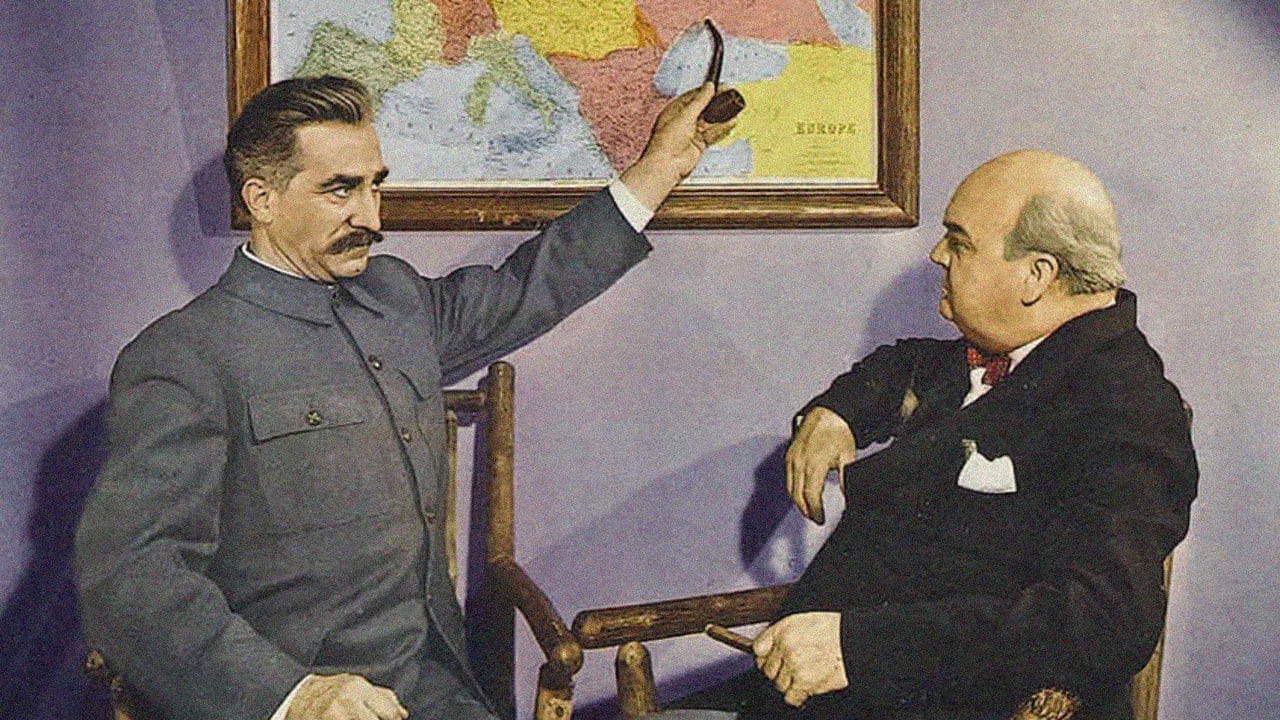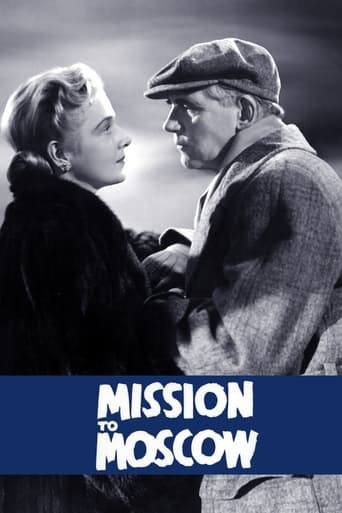

The reviews of this film are in many ways as interesting as the film itself. While nearly everyone recognizes that this films constitutes an unconscionable defense of Stalin, most also go on to make all the typical false amalgams. Stalinism=Communism=Soviet=Russia. No part of this equation is correct. It reflects an almost total lack of historical understanding and in particular an inability to distinguish between different periods and in terms of itical change and evolution.Had this film (or a similar film sympathetic to Russia) been made between 1917 and 1919, it would have been highly desirable and might have helped to prevent the damaging East-West split that has existed ever since and encouraged a more healthy political development in Soviet Russia itself.But no! At that time, the US was in the grip of its first absurd "Red Scare", beginning a process of outlawing left wing opinion that would culminate, during the second post-war scare, in the disgraceful (still unrepealed) Communist Control Act (an act that would not even find an echo in Imperial Germany or Conservative Britain but would only ever be emulated in Fascist countries) and reducing its labour movement to a kind of organised thuggery bearing little or no resemblance to a movement of working-class solidarity.Had this film (or a similar film sympathetic to Russia) been made in 1921, when the US was, as sometime occurs, enjoying a lucid interval, it would not have been in the least out of place. There was at that time considerable and deserved sympathy for Russia on the part of many ordinary Americans, and some extraordinary ones, which led to an appreciation of the considerable achievements since 1917 as well as a warm-hearted response to the Russian famine of that year. 1921 was the year when Charlie Chaplin, a generous contributor to the famine fund, organised at the behest of the government by J. Edgar Hoover, visited Russia and spoke strongly in its favour. Words and deeds that would of course so unreasonably be held against him some thirty years later by the same J. Edgar Hoover amongst others.But Russia of the 1930s was a very different matter from the Russia of 1917 or the Russia of 1921 or even the Russia of 1926 (when Pickford and Fairbanks made their acclaimed visit there). The people remained the same (here the film is not false) and many of the achievements of the Revolution remained (the film's tributes to the industrial achievement and to the important role played by women in Soviet society are perfectly valid), and there were still those, such as Bukharin - disgracefully misrepresented in the film and of whose arrest and trial Ambassador Davies so complacently approves, and Litvinov, represented sympathetically in the film but who was himself sacked in 1939 and, as a moderate and a Jew, extremely lucky to survive the purges.This is, without doubt, a film of quality, very much in the lineage of the fine war propaganda films produced by Capra, narrated by Walter Huston. One reviewer may not think much of Huston in this film but there is something amazingly seductive about the Huston voice and delivery (one always wants to listen afterwards to the classic rendering of Kurt Weill's September Song) that made his collaboration a crucial element in these films.But what makes the film disgusting is precisely its timing and the hypocrisy of that timing. Having so conspicuously failed to have extended a hand of friendship to Russia when it might have done some good - is the same foolish error not being repeated today? - the US, for purely strategic reasons chose to whitewash the emerging monster of Stalinism.It is true the US had little choice but to woo Russia at this point. The importance of the Red Army in the defeat of Hitler is undeniable and allowed the US to devote its resources to the much easier - because so unequal - task of defeating Japan. To this day the Russians quite rightly resent the way the Second World War is portrayed as a one-front war that was won in the West where, in truth, it was far more like a one-front War that was won in the East and won at a huge expense in life and suffering on the part of the Russian people.But Davies and Curtiz have gone more than a step too far in this film which compares very unfavourably with the two-part Capra film The Battle of Russia, quite the best in my view of the Why We Fight series, which in turn are in my view quite the best of Capra, which strike exactly the right note, praising Russia and Russians where praise it, leaving aside stupid anti-Communist rhetoric and without foolish ideological hostility to the Soviet Union as such, but which does not indulge in the same praise of the vile dictator Stalin and even of some of the vilest of his actions.The other irony is of course that, no sooner was the strategic imperative removed than the US would return, with an ingratitude that was akin to treachery, in an even more extreme and sordid manner, to its previous paranoia. By this time the worst excesses of Stalinism were past, the old monster was close to death and a gentle breeze of moderation slowly beginning to make itself felt. It would have been a good time for the US to close its ears to the cynical rhetoric of Winston Churchill and try and build on the wartime alliance in the interests of world peace and security...The best one can say for the US is that it is remarkably consistent both in its capacity for hypocrisy and its unswerving ability to only think in short-term strategic terms. No wonder that, today, more and more people throughout the world are coming to think of Russia as the more honest and more dependable of the two rival powers.
... View MoreThis Obvious Whitewash of Russia for Propaganda Purpose Picture was basically Commissioned by FDR. He wanted Warner Brothers to Film Ambassador Joseph E. Davies Book to Brain-Blast Americans to Lighten Up on Russia because We Needed Them in the Fight Against Fascism.America had to View Them as an "Enemy of Our Enemy" and Ignore Stalin's Atrocities, at Least for Now.To Say that Director Michael Curtiz and Screenwriter Harold Koch Delivered is to Say that They Delivered a Movie so Over the Top and Sensational is to Understate the Overstatement.The Film Ended Up being so Fawning and Fatuous that its Original Intent was Overshadowed by its Inability to See just how Ridiculous the whole Thing turned out.Nonetheless it was Released and for the Uninformed, Unaware, and Uneducated Folks of America it might have Convinced a Few that an Alliance with a Brutal Dictator was Necessary and would Save Countless American Lives by the End of the War.After the War, the Overreaction to the Soviets was just as Bad as this Overreaction during the War. It Resulted in the McCarthy Witch Hunts and a Cold War with the Soviets that Lasted a Very Long Time, and an Arms Race that Proliferated the World with Thousands of Nuclear Warheads on Both Sides.This Movie, in Retrospect, really wasn't Needed in 1943 and Making it and Releasing it was a Mistake with the Benefit of Hindsight.But, it is Worth a Watch for it was Made and it was Released during a Time when the Politicians of America and the Movie Makers of America were not Thinking Straight and is a Good Example of the "Fog of War".President Roosevelt, Warner Brothers, and Yes, Ambassador Davies should be Forgiven, because Their Intentions were Pro-American and Not Pro-Soviet, although when Viewed Today it Seems that way.
... View MoreThis 1943 film has an infamous reputation as the worst of the pro Soviet films Hollywood made during World War II. Based on the memoirs of Joseph Davies (who was ambassador to the Soviet Union at the height of the Stalinist purges of the 1930s and appears as himself in the embarrassing movie intro), it is mind numbingly naïve about the nature of Stalinist Russia. The most ridiculous part of the movie is surely its depiction of the Moscow trials of 1937, where the defendants, portrayed as witless, cowardly thugs (except for Bukharin, which looks like an evil genius), are shown as unquestionably guilty. But even the Stalin-Hitler pact of 1939 and the Soviet invasion of Finland later that year are defended here.Its monumental naivete aside, it is kind of well done, in the sense that it was filmed competently (by Michael Curtiz, who directed Casablanca among many other films) and is politically embarrassing but never boring. Stalin reportedly liked the movie and had it shown several times in his private Kremlin screening room to his Politburo buddies. Walter Huston played ambassador Davies. Many little known character actors play the different Soviet politicians, and they were obviously hired due to the physical resemblance to the characters they were playing.
... View MoreSeventy-years later, this Warner Bros. production stands mainly as an historical curiosity. The movie remains interesting for its unbridled admiration for Russia (the term 'Soviet Union' is not used). After decades of anti-Soviet portrayals, this footage really comes as a surprise. Still, the narrative furnishes historical insight into the need to support a dubious ally, particularly while the war's outcome was still in doubt (1943). No doubt, the film's early part amounts to a whitewash of Stalin's show trials, where many old Bolsheviks were eliminated as possible rivals. This, I think, remains one of the film's most hollow parts.As a movie, the two-hours are well-produced, and well-acted by Huston without hint of swagger or ego. His Ambassador Davies may be wrong in many respects but he's not dislikable in the firmness of his opinions. Importantly, about the only dramatic interest is whether a Euro-American coalition can come together to forestall Hitler's grand plans. Of course, the various political maneuverings are much too complex for real movie analysis. Then too, as political background, the Soviets could never be sure whether the capitalist West preferred a fascist Germany to a socialist USSR (consider, for example, the Spanish civil war {1936-39}). On the other hand, there is colorful footage of martial parades in Red Square and docu-footage of happy laborers in factories and fields. However, much of this can now be gotten on The History Channel. Sure, the film works as wartime propaganda, perhaps the only pro-Soviet panegyric ever to come out of Hollywood. Still, it's ironic that only a few years later, Hollywood would turn on a dime and demonize everything Soviet. But then we were assured that The Red Danube (1949) or The Iron Curtain (1949) should not be considered propaganda. After all, we were engaged in another kind of conflict, namely, the Cold War. Funny how these things work, isn't it.
... View More